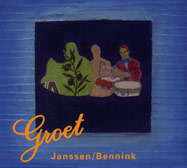Guus Janssen/Han Bennink
Groet
(Data)
Dunno
about the reader, but when I think about the concept of a piano and
drums duo the names that immediately come to my mind are those of Misha
Mengelberg and Han Bennink: a unique musical relationship - and nowadays,
also a good example of a living, breathing tradition - that created
the frame inside which their identities have developed. So in a way
it's funny for me to listen to Bennink playing against another piano
player - here I'll have to mention at least his past encounters with
Steve Beresford (Directly To Pyjamas, 1987) and Cecil Taylor (Spots,
Circles And Fantasy, 1989). Having in front of me a duo CD of Bennink
with Guus Janssen made me really curious.
I
believe I first heard Janssen's piano in the early eighties, on an album
by the Maarten Altena Octet. Since then, of course, he's became a protagonist
of the Dutch music scene under various guises, be it solo or group,
composed or improvised. Of course, Janssen is a very different player
from Mengelberg, so half the fun is listening to Bennink's Art Blakey
- who we usually hear playing against Mengelberg's Monk - having to
complement Janssen's... (Tristano? Tatum?). A clear, staccato touch
that uses both hands, motivic variations and a quite distinctive quoting/referencing
aesthetic to perfection. So we have surprises aplenty - check the boogie-woogie
that starts Pethem, to which Bennink reacts with the by now expected
enthusiasm - and the way the tune ends; almost the same could be said
of the almost-ragtime which starts Groet - Bennink on brushes.
The
recording is crystal clear - like having both musicians playing in one's
living room; one can really hear Bennink briefly leaving his drum stool
to hit some surface in the club (which is the BIMhuis, by the way, on
November 29, 2004); kudos to engineer/producer Dick Lukas.
So
we can really enjoy the "walking bass part" on Winkel (it
would have made Mingus proud); the "trill dialogue" starting
at about 3'30" in Hem; the jazz conversation in Medemeleke - a
track where the appearance of Anthony Braxton in his "in the tradition"
mode wouldn't have sounded out of place. The nice points are too many
to mention here, but I'll also say of the "almost-but-not-quite"
nod in the general direction of Functional/Monk in Ziepe; and of the
Mengelberg-penned Peer's Counting Song.
Intelligent,
funny and not at all difficult to listen too, at 43' Groet is also an
album of perfect length.
Beppe Colli
© Beppe Colli 2005
CloudsandClocks.net | March 15, 2005











